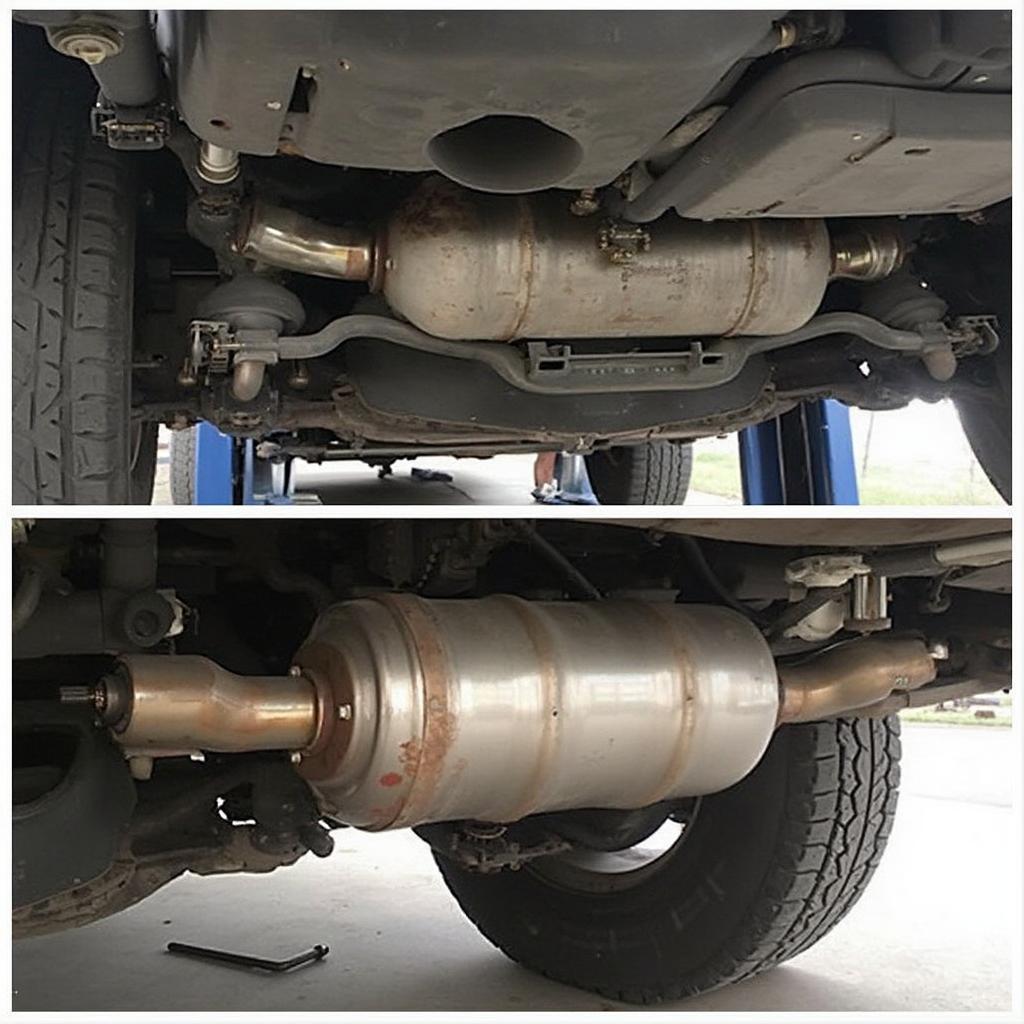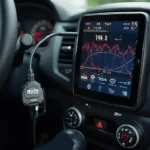The dreaded P0420 code. If you’re driving a 2011 Yukon and this code pops up on your OBD2 scanner, you’re not alone. This code indicates that your vehicle’s catalytic converter system isn’t performing efficiently. This article will delve into the causes, symptoms, diagnostic procedures, and solutions for a P0420 code specifically on a 2011 Yukon. We’ll help you understand everything you need to know about this common OBD2 trouble code.
Understanding the P0420 Code on a 2011 Yukon
The P0420 code, “Catalyst System Efficiency Below Threshold (Bank 1)”, specifically refers to the first bank of your engine, which is the side containing cylinder one. The catalytic converter is a crucial component of your Yukon’s emission control system, converting harmful exhaust gases into less harmful substances. When the downstream oxygen sensor detects that the catalytic converter isn’t effectively cleaning these gases, the P0420 code is triggered. For a 2011 Yukon, this can be caused by several factors, some simple, some complex.
Common Causes of the P0420 Code
Several issues can trigger a P0420 code in your 2011 Yukon. Understanding the potential culprits helps pinpoint the problem quickly and efficiently. These include:
- Faulty Oxygen Sensors: A malfunctioning upstream or downstream oxygen sensor can provide inaccurate readings to the engine control module (ECM), triggering the P0420 code even if the catalytic converter is functioning correctly.
- Damaged Catalytic Converter: While often expensive, a failing or damaged catalytic converter is a common cause of this code. Physical damage, excessive heat, or internal component failure can all contribute to decreased efficiency.
- Exhaust Leaks: Leaks in the exhaust system, particularly before the catalytic converter, can introduce excess oxygen and disrupt the sensor readings, mimicking a faulty catalytic converter.
- Engine Misfires: Consistent engine misfires can overload the catalytic converter with unburnt fuel, reducing its efficiency and triggering the P0420. 2011 yukon obd2 code p0420 often indicates an underlying issue that requires attention.
- Rich Fuel Mixture: A fuel mixture that is too rich can cause similar problems to misfires, overwhelming the catalytic converter and triggering the code.
Diagnosing the P0420 Code in Your 2011 Yukon
Diagnosing a P0420 requires a systematic approach to rule out simpler causes before jumping to the expensive conclusion of a faulty catalytic converter.
- Check for other codes: Scanning for other OBD2 codes can provide valuable clues. Misfire codes or other oxygen sensor codes can point towards related problems.
- Inspect for exhaust leaks: Visually inspect the exhaust system for any signs of leaks, cracks, or damage. A hissing sound can also indicate a leak.
- Test oxygen sensor readings: Use an OBD2 scanner to monitor the voltage readings of both upstream and downstream oxygen sensors. Compare the readings to manufacturer specifications.
- Check fuel pressure and mixture: Ensure that the fuel pressure and air/fuel mixture are within the correct parameters. A fuel pressure gauge and analysis of the oxygen sensor data can help determine this.
- Inspect the catalytic converter: A visual inspection of the catalytic converter can reveal physical damage or signs of overheating. Tapping the converter gently can reveal internal damage if it rattles.
Fixing the P0420 Code: Solutions and Repairs
Once you have diagnosed the cause of the P0420 code, you can take the appropriate steps to repair the issue.
- Replace faulty oxygen sensors: If the oxygen sensors are faulty, replacing them is a relatively straightforward and cost-effective solution.
- Repair exhaust leaks: Patching or replacing damaged sections of the exhaust system will address leaks and restore proper exhaust flow.
- Address engine misfires: Diagnosing and repairing the underlying cause of engine misfires is crucial. This could involve replacing spark plugs, ignition coils, or other engine components.
- Adjust fuel mixture: If the fuel mixture is too rich, adjustments to the fuel system may be necessary. This may involve cleaning or replacing fuel injectors or adjusting the fuel pressure regulator.
- Replace the catalytic converter: If the catalytic converter is confirmed to be faulty, replacement is typically the only option.
 Replacing the Catalytic Converter on a 2011 Yukon
Replacing the Catalytic Converter on a 2011 Yukon
Conclusion
The P0420 code in your 2011 Yukon signals a problem with your vehicle’s emission control system, specifically the catalytic converter’s efficiency. By following the diagnostic steps outlined in this article, you can pinpoint the cause and take appropriate action. Addressing the underlying issue promptly not only ensures your vehicle’s compliance with emission standards but also prevents potential further damage and costly repairs.
FAQ
- Can I drive my 2011 Yukon with a P0420 code? While you can still drive, it’s recommended to address the issue as soon as possible to prevent further damage and potential failures.
- Is a P0420 code always a bad catalytic converter? Not necessarily. Faulty oxygen sensors, exhaust leaks, and other issues can also trigger this code.
- How much does it cost to replace a catalytic converter on a 2011 Yukon? The cost can vary depending on the specific converter and labor costs, but it can be a significant expense.
- Can I clear the P0420 code myself? Yes, you can clear the code with an OBD2 scanner, but the code will likely return if the underlying problem isn’t addressed.
- How can I prevent a P0420 code in the future? Regular maintenance, including timely tune-ups and addressing any engine performance issues promptly, can help prevent this code.
- What other codes are related to the P0420? P0430 is similar, indicating a problem with bank 2. Other codes related to oxygen sensors or misfires can also be connected.
- Can using the wrong fuel trigger a P0420? Using lower octane fuel than recommended can potentially cause problems over time, but is unlikely to be the direct cause of a P0420.
For any further assistance, contact our expert team via WhatsApp: +1(641)206-8880, Email: [email protected] or visit us at 789 Elm Street, San Francisco, CA 94102, USA. We offer 24/7 customer support.
